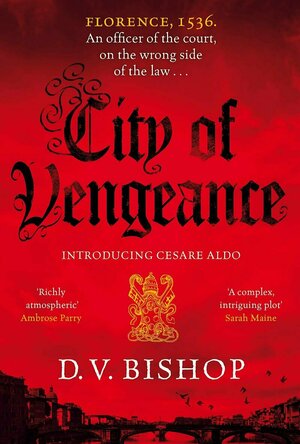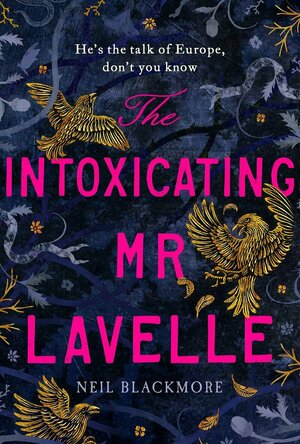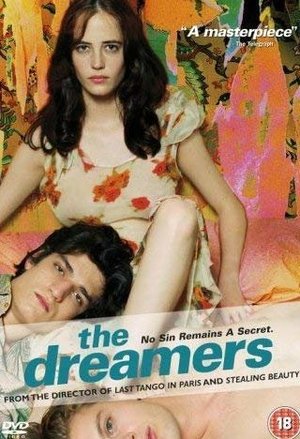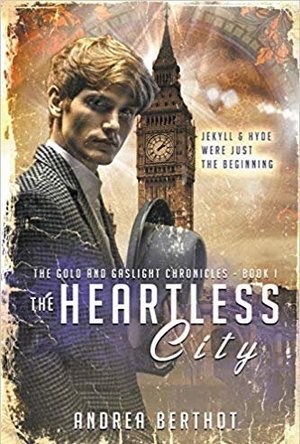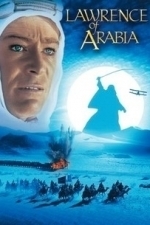Search
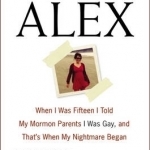
Saving Alex: When I Was Fifteen I Told My Mormon Parents I Was Gay, and That's When My Nightmare Began
Book
When Alex Cooper was fifteen years old, life was pretty ordinary in her sleepy suburban town and...
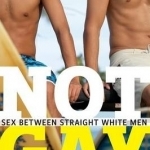
Not Gay: Sex Between Straight White Men
Book
A straight white girl can kiss a girl, like it, and still call herself straight-her boyfriend may...
ClareR (5589 KP) rated City of Vengeance in Books
Mar 30, 2021
City of Vengeance is set in 16th century Florence during the Renaissance, a time when cities in Italy were run by Dukes. Florence’s Duke was Alessandro de’ Medici.
Cesare Aldo is an officer of the criminal court and a former soldier, and when we first meet him, he is riding home to Florence from Bologna with the Jewish moneylender he’s protecting. This is where we learn just how good Also is at this part of his job. His charge reaches his home safely, despite an encounter with bandits.
Thinking he has finished his job well, Also leaves the moneylender at his home and thinks nothing more of it - until the moneylender is murdered.
Also is tasked with finding the murderer within four days, which seems impossible. Especially when you factor in all the trouble that Aldo manages to get himself in to!
Meanwhile another constable of the criminal court, Strocchi, is investigating the death of a young man. The only problem, is that he was murdered whilst wearing a dress, and homosexuality is illegal. Finding his murderer isn’t high on the courts list of priorities - in fact, there are those who work there who believe that he has got exactly what he deserves.
There’s loads of mystery and intrigue in this book, as well as heaps of historical detail. It’s fast-paced and totally unputdownable. It shows the seedier, more difficult side of life at this time, especially when we get a look in to La Stinche - a notorious prison hellhole.
Both Also and Strocchi are characters that I’m looking forward to finding out more about - especially Aldo. There’s a lot more to him than we see in this, what I hope is, the first of a series (I’m totally guessing here - but it’s not a terrible idea!).
Many thanks to Pan Macmillan for providing me with an e-copy of this book to read and review through NetGalley.
Cesare Aldo is an officer of the criminal court and a former soldier, and when we first meet him, he is riding home to Florence from Bologna with the Jewish moneylender he’s protecting. This is where we learn just how good Also is at this part of his job. His charge reaches his home safely, despite an encounter with bandits.
Thinking he has finished his job well, Also leaves the moneylender at his home and thinks nothing more of it - until the moneylender is murdered.
Also is tasked with finding the murderer within four days, which seems impossible. Especially when you factor in all the trouble that Aldo manages to get himself in to!
Meanwhile another constable of the criminal court, Strocchi, is investigating the death of a young man. The only problem, is that he was murdered whilst wearing a dress, and homosexuality is illegal. Finding his murderer isn’t high on the courts list of priorities - in fact, there are those who work there who believe that he has got exactly what he deserves.
There’s loads of mystery and intrigue in this book, as well as heaps of historical detail. It’s fast-paced and totally unputdownable. It shows the seedier, more difficult side of life at this time, especially when we get a look in to La Stinche - a notorious prison hellhole.
Both Also and Strocchi are characters that I’m looking forward to finding out more about - especially Aldo. There’s a lot more to him than we see in this, what I hope is, the first of a series (I’m totally guessing here - but it’s not a terrible idea!).
Many thanks to Pan Macmillan for providing me with an e-copy of this book to read and review through NetGalley.
ClareR (5589 KP) rated The Intoxicating Mr Lavelle in Books
Apr 9, 2021
The Intoxicating Mr Lavelle rather intoxicated me, if I’m honest. It’s one of those witty yet heart-rending books that I didn’t want to stop listening to.
Ben Aldridge, the narrator, did his part so well. I believed that he was each of the separate characters - he made each of them sound so different, and he especially made Lavelle sound just how I would have imagined him to.
Two brothers, Benjamin and Edgar are on what is probably the most exciting and daunting trip of their young lives - a Grand Tour of Europe. It was what all the well-heeled young men and women would do at the time, in the hope that they’d make good business and, you never know, romantic connections. However, it quickly becomes apparent that the Bowen brothers are looked down on as being of the mercantile class. This horrified me as a modern day reader. Firstly, that two sheltered, innocent boys should be sent out to travel across Europe alone (must be the ‘Mother of Sons’ in me), secondly, that the upper classes were so bloody rude! They had the power to destroy someone with just a word. I could have scooped these boys up and taken them home, just to remove them from these horrendous people.
This is also the story of Benjamin’s self discovery. He meets and falls in love with Horace Lavelle at a time when men could be hanged as a ‘sodomite’. The author is upfront at the start that he had taken some liberties with this book. Homosexuality was illegal. No-one would take a chance of showing that they were gay. And there is that element of danger, of being found out, in this book despite those liberties.
But it’s such a lovely book - I wanted Benjamin to be happy, and I could see the potential for a train wreck ahead. And that’s all I’ll say! What I will say, is that this is a novel well worth your time!
Ben Aldridge, the narrator, did his part so well. I believed that he was each of the separate characters - he made each of them sound so different, and he especially made Lavelle sound just how I would have imagined him to.
Two brothers, Benjamin and Edgar are on what is probably the most exciting and daunting trip of their young lives - a Grand Tour of Europe. It was what all the well-heeled young men and women would do at the time, in the hope that they’d make good business and, you never know, romantic connections. However, it quickly becomes apparent that the Bowen brothers are looked down on as being of the mercantile class. This horrified me as a modern day reader. Firstly, that two sheltered, innocent boys should be sent out to travel across Europe alone (must be the ‘Mother of Sons’ in me), secondly, that the upper classes were so bloody rude! They had the power to destroy someone with just a word. I could have scooped these boys up and taken them home, just to remove them from these horrendous people.
This is also the story of Benjamin’s self discovery. He meets and falls in love with Horace Lavelle at a time when men could be hanged as a ‘sodomite’. The author is upfront at the start that he had taken some liberties with this book. Homosexuality was illegal. No-one would take a chance of showing that they were gay. And there is that element of danger, of being found out, in this book despite those liberties.
But it’s such a lovely book - I wanted Benjamin to be happy, and I could see the potential for a train wreck ahead. And that’s all I’ll say! What I will say, is that this is a novel well worth your time!
LoganCrews (2861 KP) rated The Dreamers (2003) in Movies
Dec 3, 2020 (Updated Dec 3, 2020)
Actual lines of dialogue from this movie:
"𝘐 𝘥𝘰𝘯'𝘵 𝘣𝘦𝘭𝘪𝘦𝘷𝘦 𝘪𝘯 𝘎𝘰𝘥. 𝘉𝘶𝘵 𝘪𝘧 𝘐 𝘥𝘪𝘥, 𝘩𝘦 𝘸𝘰𝘶𝘭𝘥 𝘣𝘦 𝘢 𝘣𝘭𝘢𝘤𝘬, 𝘭𝘦𝘧𝘵-𝘩𝘢𝘯𝘥𝘦𝘥 𝘨𝘶𝘪𝘵𝘢𝘳𝘪𝘴𝘵."
"𝘐'𝘮 𝘵𝘰𝘰 𝘸𝘦𝘵 𝘵𝘰 𝘢𝘯𝘴𝘸𝘦𝘳 [𝘵𝘩𝘦 𝘱𝘩𝘰𝘯𝘦]."
"𝘠𝘰𝘶'𝘳𝘦 𝘢 𝘣𝘪𝘨 𝘮𝘰𝘷𝘪𝘦 𝘣𝘶𝘧𝘧, 𝘳𝘪𝘨𝘩𝘵? 𝘛𝘩𝘦𝘯 𝘸𝘩𝘺 𝘥𝘰𝘯'𝘵 𝘺𝘰𝘶 𝘵𝘩𝘪𝘯𝘬 𝘰𝘧 𝘔𝘢𝘰 𝘢𝘴 𝘢 𝘨𝘳𝘦𝘢𝘵 𝘥𝘪𝘳𝘦𝘤𝘵𝘰𝘳... 𝘮𝘢𝘬𝘪𝘯𝘨 𝘢 𝘮𝘰𝘷𝘪𝘦 𝘸𝘪𝘵𝘩 𝘢 𝘤𝘢𝘴𝘵 𝘰𝘧 𝘮𝘪𝘭𝘭𝘪𝘰𝘯𝘴."
The far less entertaining 𝘊𝘳𝘶𝘦𝘭 𝘐𝘯𝘵𝘦𝘯𝘵𝘪𝘰𝘯𝘴 meets... idek, the really long talky parts from 𝘛𝘦𝘵𝘳𝘰? A woeful experience - uses a ton of intellectual jargon but says next to nothing. On the one hand, perfectly emulates this sort of 20-something who thinks they're the most original being on the planet despite being another clichéd story no one wants to be around... but on the other, at what cost? These people seem beyond insufferable to be around - three pretentious, odious fucks sit around drinking wine and smoking while spewing superficial first-year-film-major histrionics, jerking off, and smelling each others' underwear. Every bit as lumbering, surface-level, and pompous as that sounds. Usually I'm all for these conceited combinations of toxic people, self-destruction, and explicit sex but this is virtual parody levels of this sort of "wants to be a 70s movie really bad" cinema. Has a few good scenes that actually find a palpable mood but otherwise exists almost solely to brag about how many old movies it's seen, uses both those aforementioned films and the real life 1968 Paris riots as not much more than mere window dressing while failing to confront whatever shred of an idea it briefly poses for a scene or two. Eva Green and the dad are the only two tolerable performances. All but begs you to find it audacious and daring with a shit-eating sneer while simultaneously gutting the homosexuality from the original text so this won't steer *too* far off the hetero curve. And then it ends with a total "who cares?". Pretty but dumb. The sex stuff is kind of decent, though.
"𝘐 𝘥𝘰𝘯'𝘵 𝘣𝘦𝘭𝘪𝘦𝘷𝘦 𝘪𝘯 𝘎𝘰𝘥. 𝘉𝘶𝘵 𝘪𝘧 𝘐 𝘥𝘪𝘥, 𝘩𝘦 𝘸𝘰𝘶𝘭𝘥 𝘣𝘦 𝘢 𝘣𝘭𝘢𝘤𝘬, 𝘭𝘦𝘧𝘵-𝘩𝘢𝘯𝘥𝘦𝘥 𝘨𝘶𝘪𝘵𝘢𝘳𝘪𝘴𝘵."
"𝘐'𝘮 𝘵𝘰𝘰 𝘸𝘦𝘵 𝘵𝘰 𝘢𝘯𝘴𝘸𝘦𝘳 [𝘵𝘩𝘦 𝘱𝘩𝘰𝘯𝘦]."
"𝘠𝘰𝘶'𝘳𝘦 𝘢 𝘣𝘪𝘨 𝘮𝘰𝘷𝘪𝘦 𝘣𝘶𝘧𝘧, 𝘳𝘪𝘨𝘩𝘵? 𝘛𝘩𝘦𝘯 𝘸𝘩𝘺 𝘥𝘰𝘯'𝘵 𝘺𝘰𝘶 𝘵𝘩𝘪𝘯𝘬 𝘰𝘧 𝘔𝘢𝘰 𝘢𝘴 𝘢 𝘨𝘳𝘦𝘢𝘵 𝘥𝘪𝘳𝘦𝘤𝘵𝘰𝘳... 𝘮𝘢𝘬𝘪𝘯𝘨 𝘢 𝘮𝘰𝘷𝘪𝘦 𝘸𝘪𝘵𝘩 𝘢 𝘤𝘢𝘴𝘵 𝘰𝘧 𝘮𝘪𝘭𝘭𝘪𝘰𝘯𝘴."
The far less entertaining 𝘊𝘳𝘶𝘦𝘭 𝘐𝘯𝘵𝘦𝘯𝘵𝘪𝘰𝘯𝘴 meets... idek, the really long talky parts from 𝘛𝘦𝘵𝘳𝘰? A woeful experience - uses a ton of intellectual jargon but says next to nothing. On the one hand, perfectly emulates this sort of 20-something who thinks they're the most original being on the planet despite being another clichéd story no one wants to be around... but on the other, at what cost? These people seem beyond insufferable to be around - three pretentious, odious fucks sit around drinking wine and smoking while spewing superficial first-year-film-major histrionics, jerking off, and smelling each others' underwear. Every bit as lumbering, surface-level, and pompous as that sounds. Usually I'm all for these conceited combinations of toxic people, self-destruction, and explicit sex but this is virtual parody levels of this sort of "wants to be a 70s movie really bad" cinema. Has a few good scenes that actually find a palpable mood but otherwise exists almost solely to brag about how many old movies it's seen, uses both those aforementioned films and the real life 1968 Paris riots as not much more than mere window dressing while failing to confront whatever shred of an idea it briefly poses for a scene or two. Eva Green and the dad are the only two tolerable performances. All but begs you to find it audacious and daring with a shit-eating sneer while simultaneously gutting the homosexuality from the original text so this won't steer *too* far off the hetero curve. And then it ends with a total "who cares?". Pretty but dumb. The sex stuff is kind of decent, though.
Eleanor Luhar (47 KP) rated The Heartless City in Books
Jun 24, 2019
Read my original review: https://bookmarkedreading.wordpress.com/2015/10/18/book-review-the-heartless-city/
I received a copy of this book from NetGalley in return of my honest opinion.
The Heartless City is based on the infamous story of Jekyll & Hyde, with a wonderful new plot.
London is infested with Hydes thanks to Dr Henry Jekyll. Jekyll is also responsible for Iris; an American girl with a unique talent.
Buckingham palace is home to the Lord Mayor, as well as his son Cam and the doctor and his own son, Elliott Morrissey. Elliott also has a strange gift, but not one he was born with. After taking a serum intended to remove his empathy, Elliott found that it did quite the opposite. Instead, he became an empath - able to feel the emotions of those around him as if they were his own.
The characters in this old-fashioned story are all very different, including the strong, independent female figure of 15-year-old Philomena Blackwell. She refuses to fit in with the typical norms of her time, which I really liked.
Elliott's new empathy is also used to confront the negative opinions on homosexuality when he feels his friends love for each other and realises that it is no different to the love he himself would feel for a girl. I absolutely loved this little sub-plot.
The book is written to sound like it was written in the 1900s, when it was set. However, I found the story a little slow at times, and then far too fast toward the end. Everything just kind of happened all at once. That being said, the conclusion was very clever and interesting.
It was definitely an interesting read. I tend to just read more modern novels, so this was a refreshing change. But there are definitely a few things that could be changed, so I'm going to give 3.5 stars to The Heartless City.
I received a copy of this book from NetGalley in return of my honest opinion.
The Heartless City is based on the infamous story of Jekyll & Hyde, with a wonderful new plot.
London is infested with Hydes thanks to Dr Henry Jekyll. Jekyll is also responsible for Iris; an American girl with a unique talent.
Buckingham palace is home to the Lord Mayor, as well as his son Cam and the doctor and his own son, Elliott Morrissey. Elliott also has a strange gift, but not one he was born with. After taking a serum intended to remove his empathy, Elliott found that it did quite the opposite. Instead, he became an empath - able to feel the emotions of those around him as if they were his own.
The characters in this old-fashioned story are all very different, including the strong, independent female figure of 15-year-old Philomena Blackwell. She refuses to fit in with the typical norms of her time, which I really liked.
Elliott's new empathy is also used to confront the negative opinions on homosexuality when he feels his friends love for each other and realises that it is no different to the love he himself would feel for a girl. I absolutely loved this little sub-plot.
The book is written to sound like it was written in the 1900s, when it was set. However, I found the story a little slow at times, and then far too fast toward the end. Everything just kind of happened all at once. That being said, the conclusion was very clever and interesting.
It was definitely an interesting read. I tend to just read more modern novels, so this was a refreshing change. But there are definitely a few things that could be changed, so I'm going to give 3.5 stars to The Heartless City.
Haley Mathiot (9 KP) rated Glorious in Books
Apr 27, 2018
It's really hard to say if I liked Glorious or not. I liked it in some ways, in some ways it was good but I could not like it, and in other ways I disliked it.
One of the reasons I did like it, was the writing. McFadden has an interesting writing style: She writes like people think. You get asked a question and you have a million things you want to say, and a million thoughts go through your head at light speed, but all you say is a short quick answer that has no significance to the person who asked, but has monumental significance to you because of your thoughts behind all of it? That's what reading Glorious feels like, and that's how McFadden writes. It's beautiful and insightful.
Glorious is really hard to enjoy, even if you do like it, because of the things that happen. It's a tragic time period, and a lot of horrible things happen to poor Easter. She witnesses families being torn apart by abuse and rape, she sees people die, she commits sins, she gets wrapped up with the wrong people. There are good parts, wonderful parts that make you smile and sigh and say "thank God something good is finally happening to the poor girl." But then there are other parts that say "oh will it ever end for poor Easter?" It's hard to enjoy stuff like rape and murder and lynching. Glorious is a wakeup call, reminding us what life was like for Black Americans (respectively) after they got their freedom, but before they gained equality with Whites.
I got to Chapter 23, about 2/3 of the way through, when I stopped reading. It didn't feel like anything was happening. I mean, lots of things happened to Easter, but nothing was happening in the story. It was just her life written out, and it was too broad. There was no main plot, it was all subplot.
I "enjoyed" (or maybe appreciated is a better word) the part that I read, however I don't think I should read something unless I feel urged to continue.
Content: Adult content. Language, violence, rape, etc. Has some homosexuality
Recommendation: Ages 18+
One of the reasons I did like it, was the writing. McFadden has an interesting writing style: She writes like people think. You get asked a question and you have a million things you want to say, and a million thoughts go through your head at light speed, but all you say is a short quick answer that has no significance to the person who asked, but has monumental significance to you because of your thoughts behind all of it? That's what reading Glorious feels like, and that's how McFadden writes. It's beautiful and insightful.
Glorious is really hard to enjoy, even if you do like it, because of the things that happen. It's a tragic time period, and a lot of horrible things happen to poor Easter. She witnesses families being torn apart by abuse and rape, she sees people die, she commits sins, she gets wrapped up with the wrong people. There are good parts, wonderful parts that make you smile and sigh and say "thank God something good is finally happening to the poor girl." But then there are other parts that say "oh will it ever end for poor Easter?" It's hard to enjoy stuff like rape and murder and lynching. Glorious is a wakeup call, reminding us what life was like for Black Americans (respectively) after they got their freedom, but before they gained equality with Whites.
I got to Chapter 23, about 2/3 of the way through, when I stopped reading. It didn't feel like anything was happening. I mean, lots of things happened to Easter, but nothing was happening in the story. It was just her life written out, and it was too broad. There was no main plot, it was all subplot.
I "enjoyed" (or maybe appreciated is a better word) the part that I read, however I don't think I should read something unless I feel urged to continue.
Content: Adult content. Language, violence, rape, etc. Has some homosexuality
Recommendation: Ages 18+
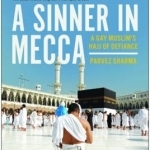
A Sinner in Mecca: A Gay Muslim's Hajj of Defiance
Book
This is the Islam you've never been allowed to see. Daringly reported from its frontlines and...
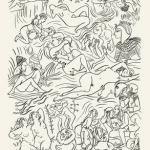
The Story of Sex: From Apes to Robots
Philippe Brenot, Laetitia Coryn and Will McMorran
Book
*The French Best-seller* 'The book France won't stop talking about...undoubtedly a lovely Christmas...
